A sample text widget
Etiam pulvinar consectetur dolor sed malesuada. Ut convallis
euismod dolor nec pretium. Nunc ut tristique massa.
Nam sodales mi vitae dolor ullamcorper et vulputate enim accumsan.
Morbi orci magna, tincidunt vitae molestie nec, molestie at mi. Nulla nulla lorem,
suscipit in posuere in, interdum non magna.
|
This is my very subjective blog entry about our presence at the Ecumenical Church Day 2010 in Munich. It is my personal take on things. Our presence? That is FSFE and KDE together in one booth, nicely mixing green and blue.
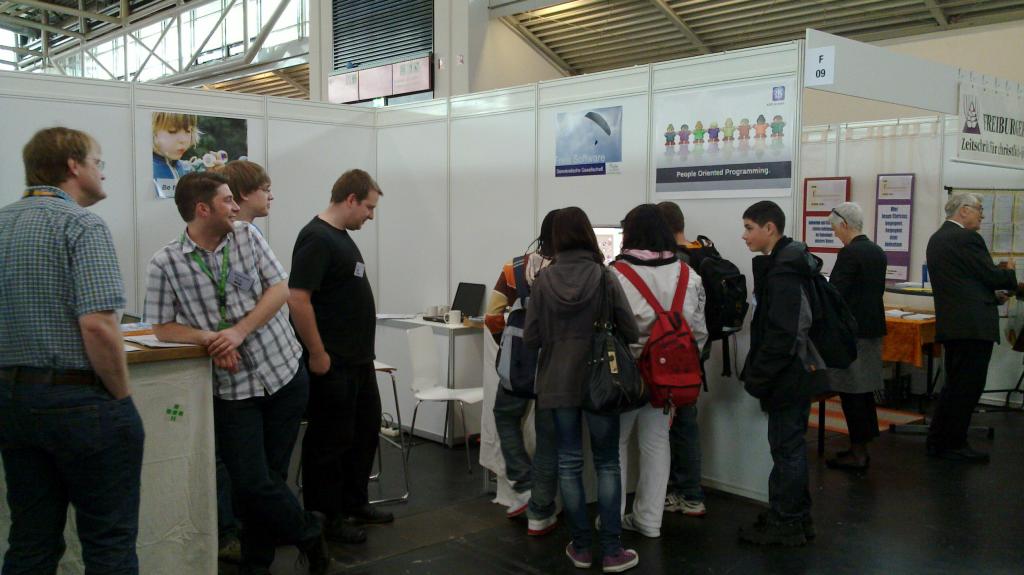
I am back home now and had a night of real sleep. Participating in this event certainly was very interesting. We were five people that care about free software, but only two of us are active in their respective churches. This lead to occasional differences in opinions and made discussions interesting. We did get along very well though, no doubt about that. OK, back to the event.
Thomas Jensch from the FSFE initiated our presence at the event and is networking with church representatives, something I could not do, since I know way too little about internal church organization (and probably don’t want to know either). I guess he will report more about that. What we (that is the KDE folks) talk about with people coming to our booth is free software in general and KDE in particular, depending on the interest of our visitors and their knowledge level. People here come with very varying backgrounds, we get the occasional Linux power user, but mostly it’s down to the basics. There is often an understanding why open standards are important and from there on we can talk about the freedoms (of free software) or drift off to how great KDE is. Sometimes it was interesting to see people running away when we ask them if they knew about free software. Typically they would mumble something about not knowing much about computers. But those are only very few people, most visitors are very interested. Sometimes on the other hand, people don’t want the philosophical talk and are happy instead to just play with our shiny KDE demo machine. This event we have different apps running, Palapeli worked quite well as eye-catcher, running on a big monitor. Of course we are happy to show more apps and give some introductions to how KDE works. Some teenagers enjoyed the puzzle and completely ignored our lecturing about philosophy behind it 🙂 We gave away quite some Linux dvds and FSFE handouts to the people that are actually interested. For the next time I hope we’ll have a one page “what is KDE” handout. That would be nice…
Sometimes the question arises why we are here. Our group, has different personal reasons for our being here. For Thomas it’s the religious part that he cares about, and this includes the institution church. Irina, Eckhart, Daniel and I are here to talk to people on a more personal level and social issues. Of course we have become experts in talking about BibleTime nonetheless. Free software enables easier access to computers, regardless of social background, so we do have a common ground with many of the participating organizations and visitors. It is interesting to hear from teachers about their frustration with traditional school book editorials, problems with copyrighted materials and how they understand that copyleft licenses should be used in education.
I do think the number of visitors and interested people is quite good. I have hardly seen the booth void of visitors. So we managed to “spread the word” to many people (incredibly bad pun intended, let’s see if people are able to forgive me for that).
Me, never having been at an event comparable to this, enjoyed the new experience. It is delightful to argue about philosophy, ethics and different world views here. Some times the topics are controversial, which is good. Sometimes I felt that some groups are way too extreme in their views (no surprise here). People pushing an embryo into my face and starting a discussion abortion will not convince me of their opinion by citing bible passages and ignoring any social argument. I walked away with nausea after talking to overly radical opinion makers. I do value the variety of opinions that people carry along and exchange. Just being radical and not listening to the arguments of the other party is not useful. Then again, some people do not have real discussion on their todo… Luckily we found a group preaching the opposite opinion for each of the extreme ones. One of our regular booth visitors was Kevin, he keeps dropping by and giving us good tips in how to deal with life as such. My personal highlight was the tea two booths from ours… that’s where I had the nicest discussions.
Other initiatives I saw, felt positive and open to me. There are people trying to deal with hiv/aids in sensible ways or pushing for mutual acceptance with other religions. I had several good discussions, sometimes people were surprised: “we don’t see that many atheists around here, it’s nice to talk to you”.
My conclusion is that KDE did a good thing in joining up with the FSFE, but sometimes I felt, that Linux distributions that are more geared towards new users would have been nice to have there. Of course we liked talking about free software, had a lot of fun and promoted KDE as great alternative desktop and applications. But we don’t have good answers on where to start sometimes.
What makes me happy, is that the free software world has become interesting enough for random people visiting a non-technical event. I think personally that in some ways, going to this event was worth more than to the usual tech events, because we could talk to people that were completely ignorant of us before and we reached a new audience. I am sure we convinced many people to try our software. Now I just wish I would know how many will switch to Linux in the coming days.
Edit: Irina really didn’t have institution church on her agenda but talked to people on a personal level.
One of the best initiatives at FOSS Nigeria was the founding of the PyKano Python user group.
It is open for anyone (with a focus on people in Nigeria). The intent is for people interested in Python to have regular local meetings but also discuss on-line. If you happen to be interested in programming and in the region, join the group!
PyKano
Back to Saturday – day 2.5 in fact. Mustapha and I had the chance to present about KDE’s community, the project in general and ended with some demonstration of the Plasma Desktop and KDE applications. Next to some of the "basics", such as Dolphin, Konqueror and Gwenview I presented and application that I just learned to appreciate the day before. Blogilo is a great help in creating blog posts. Especially when your Internet connection is slow and shaky and the electricity can be cut off at any time. These blog posts would not have been possible without writing them offline and later making a few attempts at publishing them.
The afternoon of day two concluded with a talk about localization (by a local speaker), which started for Hausa at last year’s conference (hopefully there is more uptake of it now again).
Adriaan explained about virtualization and demonstrated the installation of Kubuntu in a virtual machine. I presented KDE Education and showed some of our program gems.
Finally day three, the final day of the conference (Sunday) was again a great day. I especially appreciated that we had even more local speakers that had the courage to step up and show how they use free software. Again the range of topics was very broad.
Mr. Tata presented GNOME very enthusiastically. Another topic by Sadeeq Gambo that was well received was how to make money with free software.
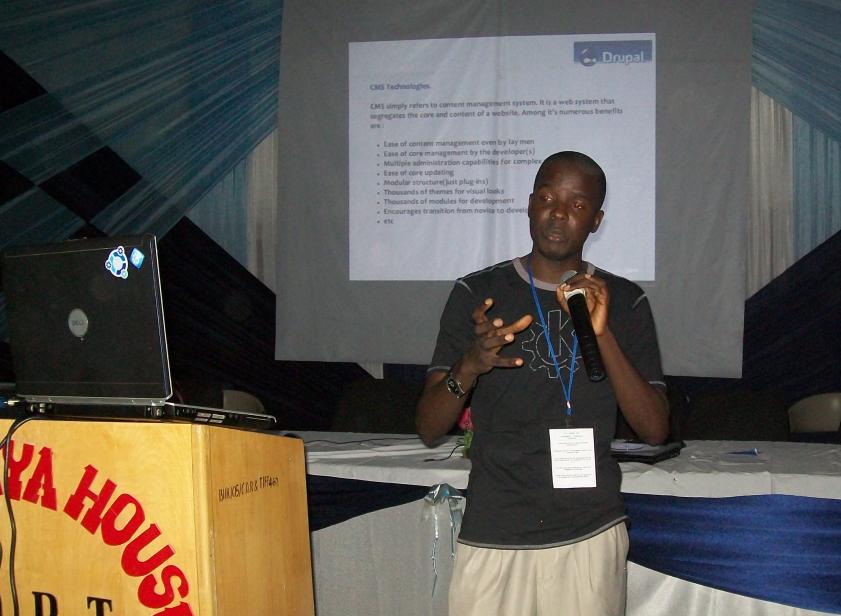
Ibrahim Dasuma from Hutsoft Nigeria Ltd presented their work with data bases and web content management systems.
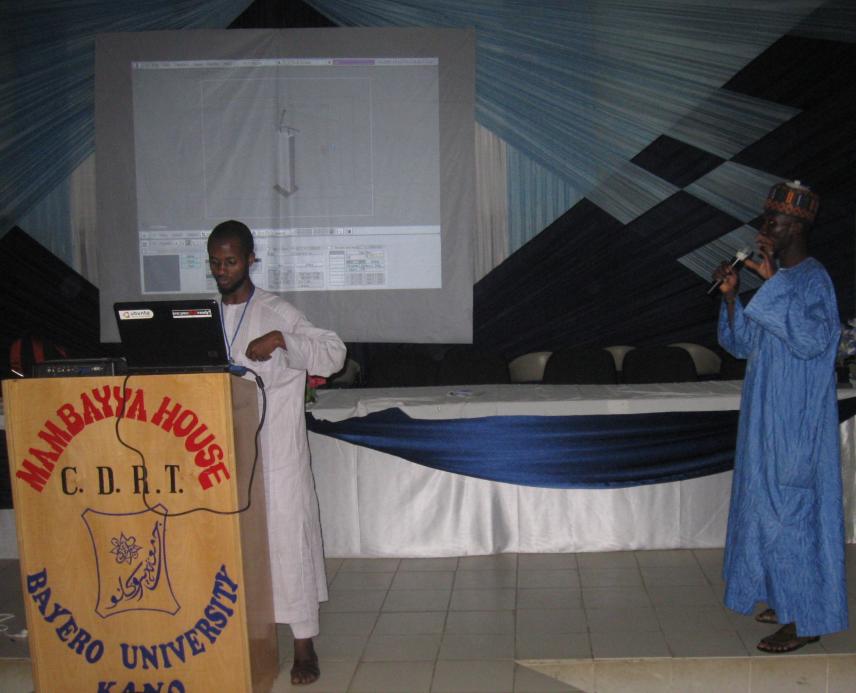
Abubakar Sadeeq presented blender to the audience’s delight. This was of course a very shiny presentation, including life modeling of the microphone stand during the talk.
One topic that I found great was the announcement of the beginning of a local Python user group: PyKano will hopefully have regular meetings to foster the exchange of knowledge about this nice programming language amongst people in Kano.
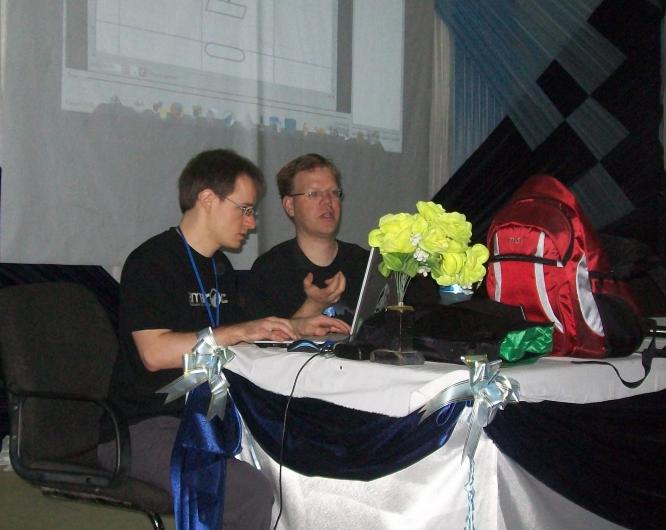
Adriaan and I could almost lean back this, but we still had to work our way through a lot of questions that came up earlier. Some people needed help with specific problems, so we also tried to help by troubleshooting some notebooks.
At the end of the conference we took some more photos and Adriaan was declared the "Warrior of FOSS Nigeria". I’m the "Champion of FOSS Nigeria" now 🙂 It was great and as a special honor we receive traditional Fulani dresses.
Monday we spent in a conference is over coma state. Now we will have just a bit more time to go for sightseeing.
Update: I added the link to PyKano user group, so we hope people will find it now!
Day two of FOSS Nigeria started in a nice way. After a whole night of sleep, we went for plantanes as breakfast.

The next stop was at the Bayero University, where many of the participants had a chance to take LPI exams. We sat down for some work and then walked over the campus and got a short tour of the library.
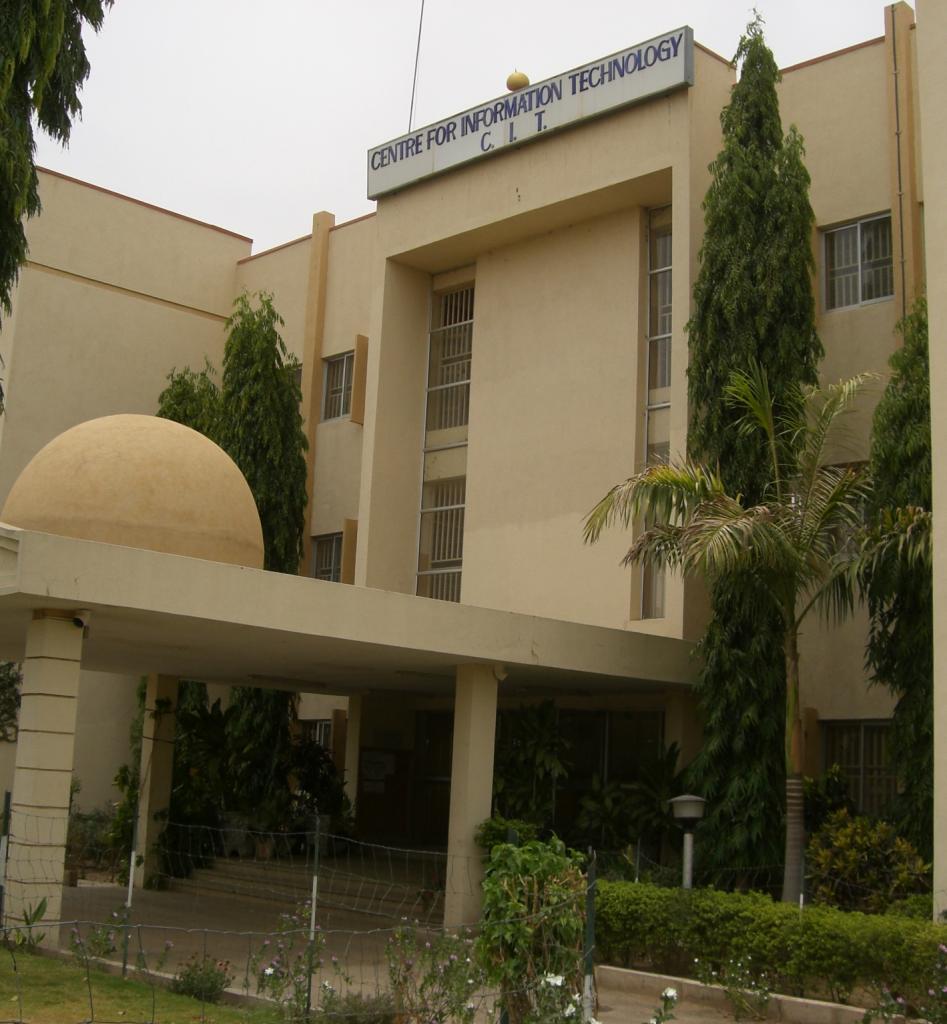
For this afternoon the presentations will become a little more practical and we’ll show how Free Software can make a difference in every day computer use.
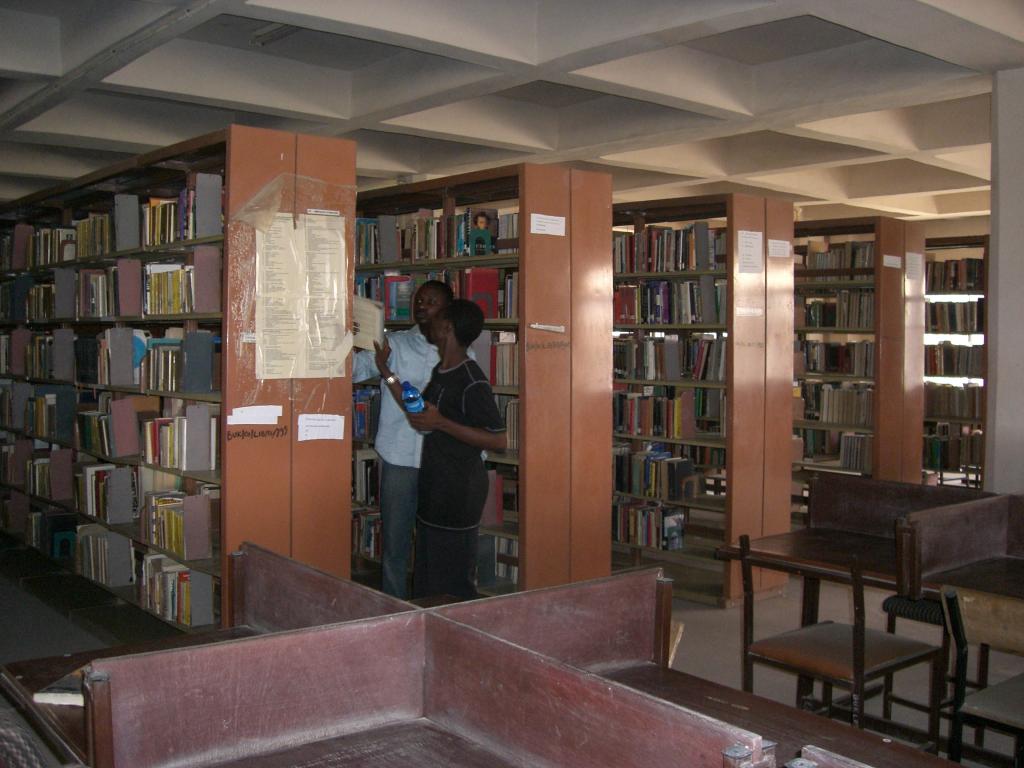
Now we are about to start the presentations again… first up Mustapha and me about KDE 🙂
Yesterday I ran into Adriaan in Amsterdam, not only by coincidence. We had a nice flight to Kano, Nigeria.
We met the Commissioner for Science and Technology at the airport and were warmly welcomed. After a drive through the night we went straight to the hotel. Motorcycles in the dimly lit streets of Kano were my first impression of Nigeria :). Of course we ended up talking until way past bed time… Mustapha and the others from Hutsoft. We got some sleep and were good to go. The conference just started this morning.
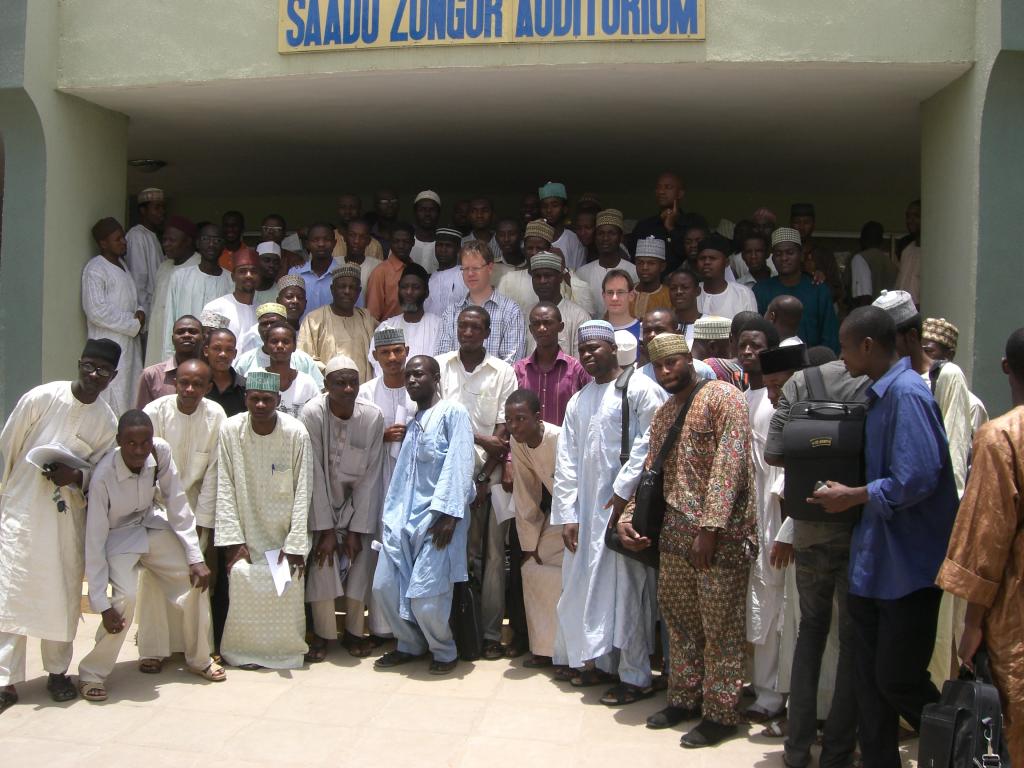
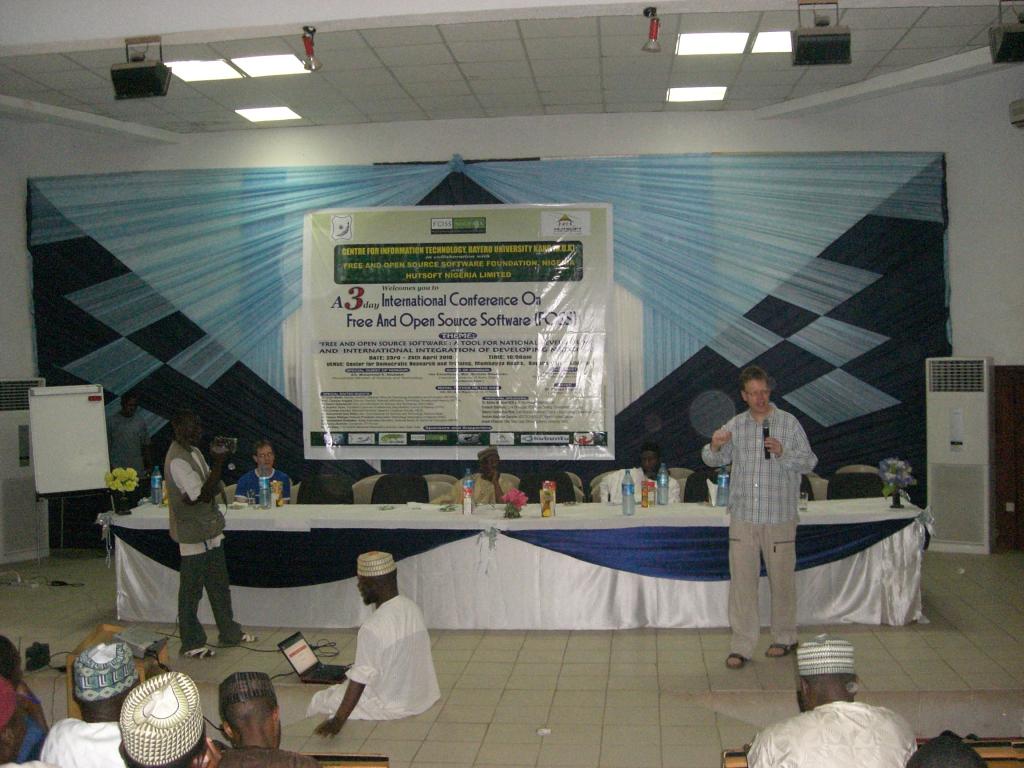
We had nice introductions and Adriaan took the time before lunch to give a general introduction to Free Software and to Linux.
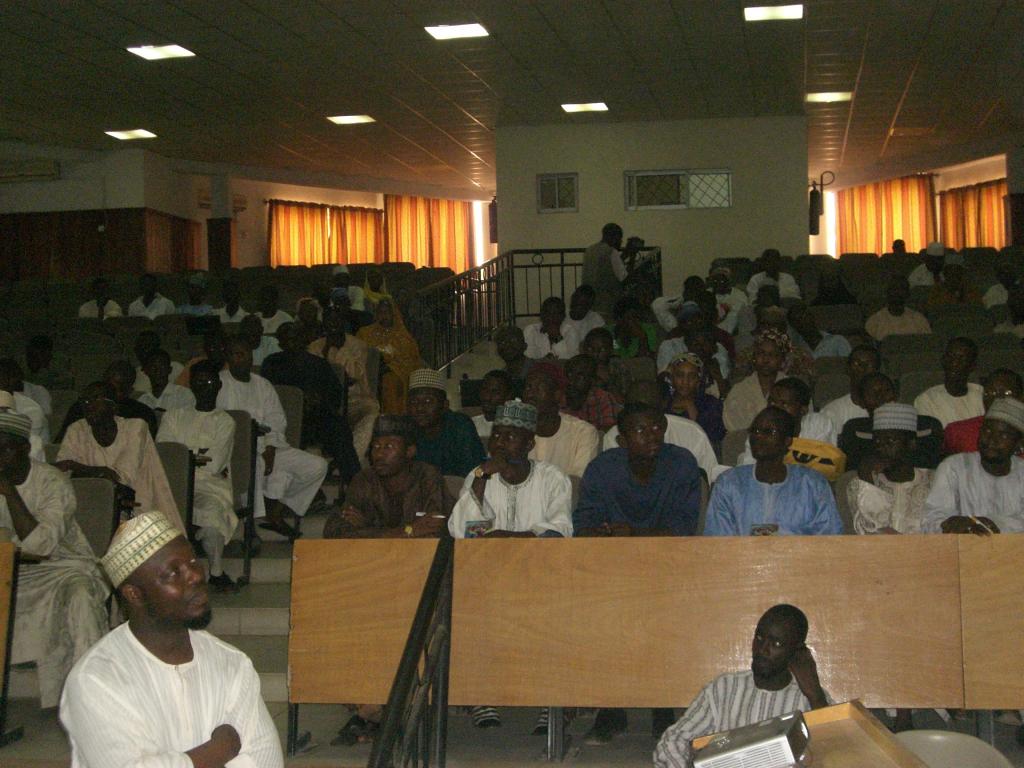
Now we’re gearing up to give an overview of available Linux Distributions, the history of Linux, some license information and source code management. But before we get to that, we still have a lot of questions to answer. It seems to be the general practice here to pass question in written form to the speakers after the presentation.
FOSS Nigeria, goes into the second round, after coming to life last year. This year Adriaan and I get the chance to visit Nigeria and promote free software and KDE (we’ll throw in other desktops for good measure of course). It seems there is a good chance we’ll actually be able to fly, so tomorrow we first meet in Amsterdam and fly southwards from there on. Now I’m preparing the last bits of luggage (I’ll be lugging a few hundred CDs to give away around). The conference kicks off on Friday and we’ll be giving quite a few talks. I’m looking forward to an exciting conference and many new impressions.
This year KDE will – together with the FSFE – participate in the ecumenical church day. We have a shared booth, now we need you.
The event takes place in Munich, a great city to visit. The event is May 13th to 16th. We are still looking for people to help with the booth. So if you don’t have anything planned for this weekend yet, consider joining this event – lots of entertainment included (music, theater, … you name it).
This is a huge event with 150000 to 200000 visitors expected. After 2008 it is the second joined church day. Visitors tend to speak German but English should be fine also.
If you’re interested, drop me a mail or get in touch at kde-promo@kde.org.
You can find more information here:
http://www.oekt.de/english/home_english.html
http://www.oekt.de/ (German)
Funny, after blogging I got some more feedback, Aaron put in a small fix and Stephen suggested another Akonadi related improvement so that I could remove another 20 lines of code that were not overly nice.
So here is the update and I get to post first screenshots (yeah, that’s what we all have been waiting for, me included 😉 since I worked blind in a way). The tool when you write a Plasma DataEngine that you’ll have a close relationship with (of hate-love possibly) is plasmaengineexplorer. It will simply show you the data offered by your engine and saves you from guessing what’s going on in there.
Starting it with the engine as parameter plasmaengineexplorer --engine=calendar saves some nerve… (I discovered this after getting tired of selecting the right engine in the combo box in it).
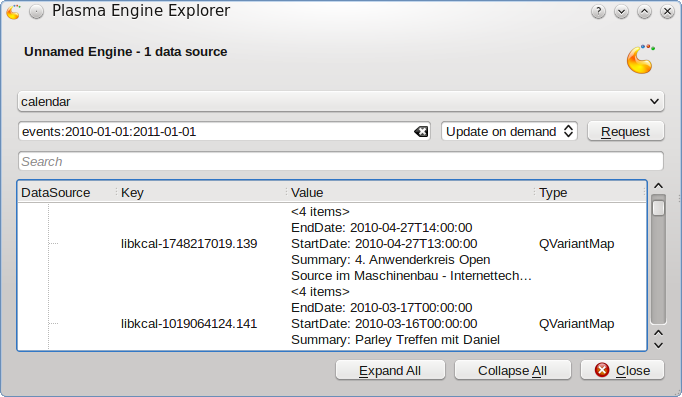
Plasma Engine Explorer – of course this is a developer tool. But it’s of great utility when writing applets also.
For Akonadi I found akonadict start/stop helpful. I have my Akonadi from 4.4 and my build from trunk in parallel and they happen to be incompatibel, so I need to start/stop them in the right environment. With akonadiconsole you can peak at the internals, so you know what’s going on and if your calendar events actually exist. This avoids waiting for data that is simply not there…
Early preview – not the final state… but it’s all there, waiting for beautification:
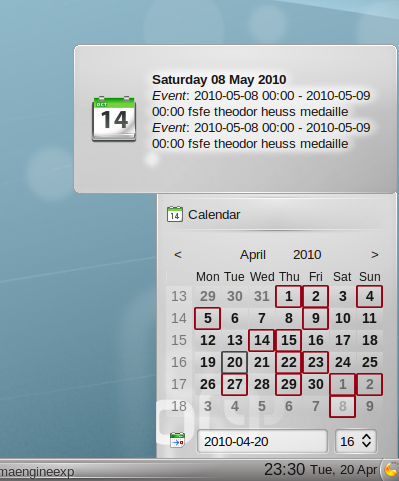
As you can see in the screenshot, we’re ready to rock… but not quite. As Aaron remarked, it still looks quite ugly. But it’s great how quickly we got this working! When you move the mouse over a particular date, you will get the tooltip that you see at the top of the screenshot. It’s just a matter of cleaning it up and maybe showing each event just once 😉
I think it’s time that Plasma and other parts of KDE get closer to each other again. I’m happy that there are some Summer of Code projects about this. Especially better integration of the PIM suite and desktop shell is great! Both Plasma and Akonadi/KDE PIM are very welcoming for new contributors… just like all other parts of KDE, so please talk to each other 😀
Maybe I should add the default disclaimer about unreleased software, yada yada: This is a preview, it will enrich your life with KDE SC 4.5, but until then it lives in a dark and dangerous place and dreams of becoming a butterfly. Or maybe not.
I think KDE SC 4.x is becoming better and better. It has reached the point where I don’t even want to think about going back.
Still there are missing bits and pieces every once in a while. At our last Fellowship of the Ring FSFE meetup here in Stuttgart, we had a nice talk… and Björn mentioned that he had almost gotten used to using KDE on his work machine 😀
Of course that made me happy for the rest of the evening. Happy enough to think about his one complaint that he had: The calendar of the Plasma panel does not show calendar events (incidences in Akonadi-speak as I learned) from the KOrganizer calendar.
Now I realized that I have a working Akonadi Calendar in my current KDE SC 4.4 release. Putting one and one together this meant creating a Data Engine that provides the calendar events to all of plasma. How hard could that be?
Akonadi is where all the PIM data is stored. Since I had done some Plasma stuff before but never looked at Akonadi before, I poked here first. With the help of Thomas McGuire I had a first prototype application running after one afternoon of asking questions. The next afternoon (this is how I spent my Easter Sunday and Monday :D) was a round of kicking at Plasma DataEngines. After putting this first round of hacking into playground I got comments from Aaron and Stephen, both made my code much easier and cleaner.
Today I sat down for an hour of cleanup and I think the current state in KDE SVN playground is quite good.
Akonadi is a pleasure to use (knowing a bit about Qt’s Model/View classes helps if you intend to get up and running quickly though). To start getting data out of Akonadi your best bet is probably to start with an ETM… EntityTreeModel – which provides you all you ever wanted (and more) of the PIM storage. Add some of the nice ready made Proxy Models onto it and you should be good to go. In fact I’m tempted to put more of this into other places 🙂
For Plasma what I learned: Subclassing DataContainer for DataEngines of a certain complexity is a great thing to do. This takes the burden of keeping track of the source requests off of you, simply create on container when a request comes in, it will get removed by Plasma when no longer needed.
Aaron sat down to make the actual Plasma Calendar use the improved DataEngine. It’s almost there, I bet he’ll update you with screenshots soonish… since I’ll miss out on them today.
Now all that is left is waiting for a yummy KDE SC 4.5 😀
Isn’t it lovely when all the puzzle pieces are there and you just need to put the last few of them in the right place?
Frank and the ownCloud crew have been happily plowing away on making ownClould your personal data storage and much more.
One vision the project has is a great integration with desktops. KDE being the obvious first target. I sat down this afternoon to implement some missing features in the Social News Plasma Applet, while Frank at the same time updated ownCloud with a cool new feature…
The server side now supplies a news stream according to our FreeDesktop.org Collaboration Service Spec.
“Social News” used to be called “OpenDesktop Activities” in our KDE SC 4.4 release. Now we have a better name and new functionality: It can display news from several sources at once.
To get news from your own ownCloud (assuming you have KDE trunk/4.5 and also the very latest ownCloud trunk):
- start SystemSettings, go to “Social Desktop” (in the advanced tab)
- add your ownCloud url with the “Add Provider” button
- enter your ownCloud username/password
- add the Social News Plasma Applet to your Desktop
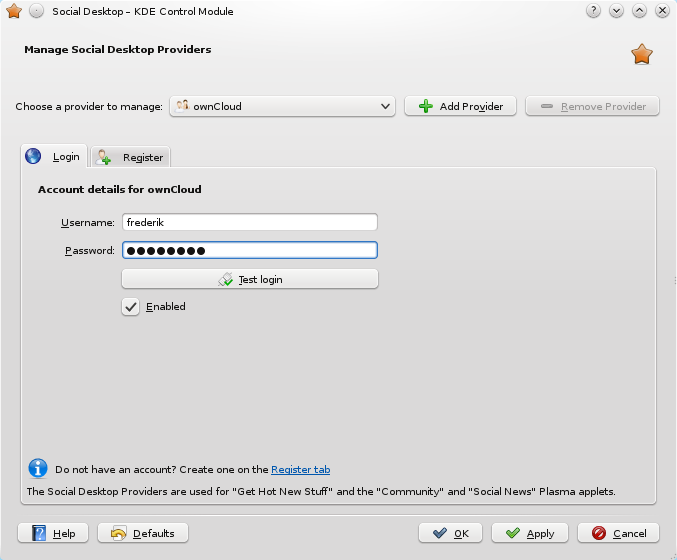
I think this is really a fun new feature. Now you will get notified what happens on your personal cloud right on the desktop.
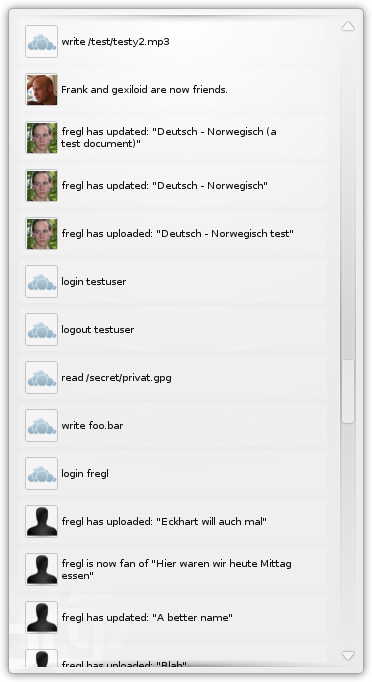
Of course the notifications on the screen-shot are only an example and not yet very useful 😉
Yes, part of the news on the screen-shot is from a test server, parts from openDesktop.org and part from our ownCloud installation. Since I keep testing the api and clients, my news feeds tend to be a little repetitive at times.
|
|













